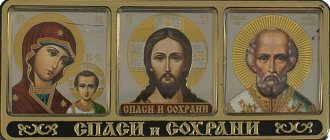Prayer to the Mother of God “Save us”
The Virgin Mary, the Mother of the Lord Jesus Christ, is especially revered in the Orthodox Church. She was given the great honor of containing the Inconceivable God within herself, of giving Him a portion of her flesh and blood.
The Son of God treated Her with reverence and love when he was on earth. The Virgin Mary did not suffer the death of an ordinary person. The Lord took her to heaven alive (dormition). Once again, Mother and Son are inextricably linked.
The Most Holy Theotokos is the embodiment of God's mercy and love for the human race. Although she resides in heaven with her soul and body, she often leaves her heavenly abodes to visit sick, wretched, and suffering people on earth.
“Most Holy Theotokos, save us!” - the shortest prayer to the Heavenly Lady. It must be accompanied by the sign of the cross (can be mental), if possible, then by a bow, bowing from the waist or bowing to the ground. This prayer is honored in monasteries, which, as you know, are considered the abode of the Most Holy Theotokos.
Also, faithful Orthodox Christians who live in the world among many affairs and concerns turn to her. The brevity of these words allows you to easily use them at any time, in difficult and unfavorable conditions for prayer. Thanks to the appeal “Most Holy Theotokos, save us!” Christians feel the protection of the Mother of God and feel protected.
Questions and answers. Orthodoxy in detail
When entering the house, you must say: “Peace to your home!” - to which the owners respond: “We accept you in peace!” Having caught your neighbors at a meal, it is customary to wish them: “An angel at the meal!” It is customary to warmly and sincerely thank our neighbors for everything: “God save us!”, “Christ save us!” or “God bless you!” - to which the answer is supposed to be: “For the glory of God.” If you think that they won’t understand you, you don’t have to thank non-church people in this way. It’s better to say: “Thank you!” or “I thank you from the bottom of my heart.”
How to greet each other. Each locality, each age has its own customs and characteristics of greetings. But if we want to live in love and peace with our neighbors, it is unlikely that short words like “hello”, “ciao” or “bye” will express the depth of our feelings and establish harmony in relationships. Over the centuries, Christians have developed special forms of greeting. In ancient times they greeted each other with the exclamation: “Christ is in our midst!” - hearing in response: “And it is, and it will be.” This is how the priests greet each other, shaking hands, kissing each other on the cheek three times and kissing each other’s right hand. However, priests can greet each other like this: “Bless.” Venerable Seraphim of Sarov addressed everyone with the words: “Christ is risen, my joy!” Modern Christians greet each other this way on Easter days - before the Ascension of the Lord (i.e. for forty days): “Christ is risen!” - and they hear in response: “Truly he is risen!”
On Sundays and holidays, it is customary for Orthodox Christians to greet each other with mutual congratulations: “Happy holiday!”
When meeting, lay men usually kiss each other on the cheek at the same time as shaking hands. It is a Moscow custom to kiss three times on the cheeks when meeting—women with women, men with men. Some pious parishioners introduce into this custom a feature borrowed from monasteries: mutual kissing on the shoulders three times, monastic-style.
From the monasteries, the custom came into the life of some Orthodox Christians to ask permission to enter a room with the following words: “Through the prayers of our Holy Fathers, Lord Jesus Christ our God, have mercy on us.” At the same time, the person in the room, if allowed to enter, must answer: “Amen.” Of course, such a rule can only be applied among Orthodox Christians; it is hardly applicable to secular people... Another form of greeting also has monastic roots: “Bless!” - and not only the priest. And if the priest answers: “God bless!”, then the layman to whom the greeting is addressed also says in response: “Bless!”
Children leaving home to study can be greeted with the words: “Your Guardian Angel!”, crossing them. You can also wish a Guardian Angel to someone heading on the road or say: “God bless you!” Orthodox Christians say the same words to each other when saying goodbye, or: “With God!”, “God’s help,” “I ask for your holy prayers,” and the like.
How to address each other. The ability to turn to an unfamiliar neighbor expresses either our love, or our selfishness, disdain for the person. The debates of the 1970s about which words were preferable for address - “comrade”, “sir” and “madam” or “citizen” and “citizen” - hardly made us any friendlier to each other. The point is not which word to choose for conversion, but whether we see in another person the same image of God as in ourselves. Of course, the primitive address “woman!”, “man!” speaks of our lack of culture. Even worse is the defiantly dismissive “hey you!” or “hey!”
But warmed by Christian friendliness and goodwill, any kind address can sparkle with the depth of feelings. You can also use the traditional pre-revolutionary Russia address “madam” and “master” - it is especially respectful and reminds us all that every person must be revered, since everyone bears the image of the Lord. But one cannot help but take into account that these days this address is of a more official nature and sometimes, due to a lack of understanding of its essence, it is negatively perceived when addressed in everyday life, which can be sincerely regretted.
It is more appropriate to address yourself as “citizen” and “citizen” for employees of official institutions. In the Orthodox community, the cordial addresses “sister”, “sister”, “sister” are accepted - to a girl, to a woman. You can address married women as “mother” - by the way, with this word we express special respect for a woman as a mother. How much warmth and love there is in him: “mother!” Remember the lines of Nikolai Rubtsov: “Mother will take a bucket and silently bring water...” The wives of priests are also called mothers, but they add the name: “Mother Natalya”, “Mother Lydia”. The same address is also accepted for the abbess of the monastery: “Mother Joanna”, “Mother Elizabeth”.
You can address a young man or a man: “brother”, “little brother”, “little brother”, “friend”; to those older in age - “father”, this is a sign of special respect. But the familiar “daddy” is unlikely to be correct. Let us remember that “father” is a great and holy word; we turn to God “Our Father.” And we can call the priest “father.” Monks often call each other “father.”
— — — — —
How to read a prayer correctly
The words “Save and Preserve” are read mainly during the day. Therefore, attention should be paid not to the external, ritual side of prayer, but to the internal content of this process.
The words “Save and preserve” must be accompanied by a feeling of humility and reverence for God. Otherwise, they will remain empty words that have not achieved their spiritual goal. It is important that prayer is accompanied by a strong inner impulse coming from the depths of the soul. It must contain both repentance and an ardent desire for God in search of love and protection.
Prayer is a whole science, the holy fathers say. And she needs to study all her life. God’s blessing is contained in small but important prayer appeals, such as “Save and preserve”, “Lord, have mercy”, etc.
The most powerful prayer for healing from diseases, damage, the evil eye: video.
How often do you turn to the Lord? Do you say the words “Save and preserve” throughout the day? Write in the comments. Save the article to bookmarks and share it on social networks.
Orthodox Life
Andrey Muzolf, teacher at the Kyiv Theological Seminary, talks about one of the professional habits of the Orthodox.
– Andrey, in the everyday life of Orthodox Christians you can notice several stereotyped, so to speak, professional phrases. One of the most common: “Save, Lord!” This expression is used daily and many times: the phrase gives thanks, starting with serious things and ending with small everyday moments: handed over salt, tea, sugar, ended the conversation - “Save, Lord”... It turns out that most people pronounce the name of God unconsciously, not thoughtfully, but according to Orthodox habit. Is this not a violation of the third commandment, which says: “Thou shalt not take the name of the Lord thy God in vain?”
– In principle, there is nothing blasphemous in the phrase “save, Lord.” And even vice versa: by saying similar words to someone who, for example, did something good and useful for us, we thereby wish for him what all Christians strive for - that is, salvation. It is worth noting that the word “thank you” is a somewhat simplified form (from “God save you” or “God save you”) of the same wish “save, Lord.” These words express the only correct reaction that an Orthodox Christian should show when wishing his neighbor the highest spiritual happiness. And there is nothing wrong if we wish those people who showed their attention to us salvation even for some little thing, for example, for a cup of tea. The Savior Himself told His disciples: everything that you do to your neighbors, you do all this to Me Himself, and therefore the one who, in the name of God, at least gives his neighbor a cup of cold water to drink will never lose his reward (see: Matt. 25: 40 and Matthew 10:42).
But at the same time, like any prayer (and wishing salvation to your neighbor is already a prayer, because we can ask for salvation only from God), this phrase must be pronounced with a certain spiritual disposition, consciously and should never be said in jest or with some jokes and mockery.
– How often can you say this expression and in what cases?
– As was already said above, the expression “save, Lord” is, first of all, a prayer, our request addressed to the Creator to save and have mercy on this or that person who has helped us in some way or, on the contrary, has done something to us some bad deed. Because of this, no rehabilitation of the above expression is simply necessary, because prayer or wishing goodness for one’s neighbor does not need justification. Regarding how often this expression can be used, it is worth saying the following: it is not so much quantity that is important, but quality. It is better to resort to mentioning the name of God less often, but at the same time do it meaningfully, with reverence, rather than every minute, but at the same time not being aware of what we are asking and from whom.
– What can be classified as everyday blasphemy?
- Any irreverent attitude towards a shrine - at home or in a temple - is blasphemy. The word “shrine” itself comes from the Hebrew word “kadosh”, which means something special, set apart from general usage. Thus, the word “shrine” already presupposes a proper attitude towards this or that holy object. Therefore, an incorrect attitude (for example, towards the name of God, holy water, prosphora, blessed oil, etc.) leads to spiritual coarsening and inertia towards everything holy in general. In this case, it is better not to keep sacred things at home at all, than to keep them at home, but treat them as ordinary things.
Interviewed by Natalya Goroshkova
A modern person greets many times a day; any conversation usually begins with a greeting. This is a generally accepted requirement of politeness in society. Most often, when meeting, they wish you health. With all the variety of greetings, etiquette is basically the same: when people meet, they wish each other good and well-being, success in work, good morning, afternoon or evening. When meeting people, you can greet them with any words, the main thing is that the greeting is cordial and sincere. Even in the usual greeting “Hello!” or “Good afternoon!” contains a completely Orthodox attitude towards man. However, there are greetings that are accepted only in the Orthodox environment.
Often, Orthodox Christians in Kyiv use the form of thanksgiving “Save, Lord!” when communicating in almost all cases: when meeting, when parting, and even when making a positive mention of a third person (“Save him, Lord!”) Although the tradition of spiritual communication is much richer and more diverse. In Central Ukraine, for example, they still greet each other in churches with a joyful: “Glory to God!” - “Glory to God forever!” Over two thousand years, Christians around the world have developed special forms of greeting. In ancient times, they greeted each other with the exclamation: “Christ is in our midst!”, Hearing in response: “And there is, and there will be.” “Before, all those present in the church also kissed each other, men - husbands, wives - wives, saying: “Christ is in the midst of us,” and immediately answering: “And there is, and there will be”; and therefore, even now, everyone who is coming, mentally gathering before him all Christians, not only those present in the temple, but also those absent, not only those close to the heart, but also those far from the heart, hastening to reconcile with those against whom he harbored some kind of dislike, hatred , displeasure, - he hurries to give a mental kiss to all of them, saying internally: “Christ is in our midst” - and answering for them: “And is, and will be,” - for without this he will be dead for all the following sacred rites, according to the word of Christ Himself: “Leave your gift and go first and reconcile with your brother and then make a sacrifice to God,” and in another place: “If anyone says: I love God, but hates his brother, it is a lie: for you do not love your brother in his presence as much as he can.” to love God without seeing Him?” (N.V. Gogol, “Reflections on the Divine Liturgy,” 1847). Nowadays priests greet each other this way, but laymen should also remember this ancient tradition.
On the first day of Easter, as well as during Bright Week and until Easter is celebrated, a solemn greeting sounds: “Christ is Risen!” - “Truly he is risen!” This greeting is repeated many times during the Easter service, and the tradition itself dates back to apostolic times. Greeting with the words “Christ is risen!” expresses joy similar to the joy of the apostles who learned about the resurrection of Christ. The Venerable Seraphim of Sarov said precisely: “Christ is Risen!” welcomed those who came to him all year round. On Sundays and holidays, it is customary for Orthodox Christians to greet each other with mutual congratulations: “Happy holiday!”, and on the eve of the holiday – “Happy Holy Evening.” And on the feast of the Nativity of Christ, Orthodox Christians greet each other with the words: “Christ is born!”, “Christ is born!”; “We praise Him!”, “Glory to Yogo!” - sounds in response.
From the monasteries the tradition came into everyday life of asking permission to enter a room with the following words: “Through the prayers of the saints, our fathers, Lord Jesus Christ our God, have mercy on us.” At the same time, the person in the room, if allowed to enter, must answer: “Amen.” Of course, such a tradition is possible only among Orthodox monks; it is hardly applicable to lay people.
Children leaving home to study can be greeted with the words “Guardian Angel!” by crossing them. You can also wish a Guardian Angel to someone setting off on a journey, or say: “God bless you!”, or “God help you!” Orthodox Christians say the same words to each other when saying goodbye, or: “With God!”, “God’s help,” “I ask for your holy prayers,” and the like.
In the ancient Russian code “Domostroy,” a rule is given on how to greet someone when they come to visit: first bow to the icons, then to the owners with the words “Peace to this house.” Having caught your neighbors at a meal, it is customary to wish them: “An angel at the meal!” For everything, it is customary to warmly and sincerely thank your neighbors: “Save, Lord!”, “Save, Christ!”, or “Save you, God!”, to which the answer is supposed to be: “For the glory of God.” But if you think that people will not understand you, it is not necessary to thank you in this way. It’s better to say: “Thank you!”, or “I am grateful to you from the bottom of my heart.”
According to tradition, when two people meet, the youngest (by age or in the church hierarchy) should say the greeting first, and the elder should answer him. For example, usually when a layman meets a priest, the first one says: “Christ is risen! (Bless (those), father/honest father),” and the second replies: “Truly he is risen! (God bless).” Let us remind you that in Orthodoxy it is not customary to address a priest with the words “holy father”; they say: “honest father” (for example: “Pray for me, honest father”).
It is not customary to address a priest by his first name or patronymic; he is called by his full name with the addition of the word “father”: “Father Alexy”, or “father”. The deacon may also be addressed by his name, which must be preceded by the word “father.” You are not supposed to take a blessing from a deacon.
Having met a priest in vestments (in a cassock with a cross or in liturgical vestments with an epitrachelion and armbands), ask him for a blessing, this will be your greeting. Approach the priest, bend over a little, fold your right hand over your left, palms up, and say: “Father, bless.”
Father, making the sign of the cross over you, says: “God bless”, or “In the name of the Father and the Son and the Holy Spirit” - and places his right, blessing hand on your palms. At this moment, the lay person receiving the blessing kisses the priest's hand. It happens that kissing the hand confuses some beginners. We should not be embarrassed - we are not kissing the priest’s hand, but Christ himself, who at this moment is invisibly standing and blessing us. You just shouldn’t make the sign of the cross before taking a blessing from the priest. If the priest puts his hand on your head, then you do not need to kiss it.
If several priests are present, led by a bishop, approach only him for a blessing. If you have taken a blessing from one priest, and several more are standing nearby, turn to them with the words: “Bless, honest fathers,” and bow. If you are in a group of believers, the men in seniority come up first for the blessing (church ministers first, as if setting an example), then the women come, and the children come last. This rule also applies to the family: the husband comes first, the wife, then the children. When saying goodbye, ask the priest for a blessing again with the words “Forgive me, father, and bless me.”
In the Orthodox Church, on official occasions, it is customary to address a priest as “Your Reverence,” and to address a rector, the vicar of a monastery, if he is an abbot or archimandrite, as “Your Reverence,” and if the vicar is a hieromonk, “Your Reverence.” The bishop is addressed as “Your Eminence,” and the archbishops and metropolitans as “Your Eminence.” In a conversation, you can address a bishop, archbishop and metropolitan less formally - “Vladyka”, and the abbot of a monastery - “father vicar” or “father abbot”. It is customary to address His Beatitude the Metropolitan of Kyiv, the Primate of the Ukrainian Orthodox Church as “Your Beatitude,” and to His Holiness the Patriarch as “Your Holiness.” All these appeals, naturally, do not mean the holiness of this or that particular person - a priest or Patriarch; they express respect for the sacred rank of confessors and hierarchs.
Evgenia Kudryavtseva
“Pechersk leaf” No. 20 (48)
If you find an error, please select a piece of text and press Ctrl+Enter.
Post Views: 28,352











